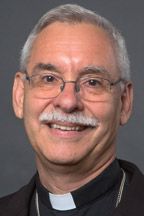
Bishop Anthony B. Taylor delivered this homily Jan. 26 for the women’s vocation discernment retreat.
Our first reading today from St. Paul’s second letter to Timothy is just perfect for a vocations discernment retreat, so I’d like to speak about it in some detail today. St. Paul starts this letter by telling Timothy just how he views his own vocation as an apostle — and thus by extension any vocation that truly comes from the Lord.
And isn’t that true for you and me? Maybe not from everyone — Paul doesn’t mention Timothy’s father or grandfather — but Paul points out that he does have all the support he needs. So the time has come to set aside his doubts and “stir into flame the gift of God” that he has received. And this will give him courage to replace his cowardice with “power, love and self-control.”
Isn’t that a good message for you and me? To remind me to “stir into flame the gift of God” that I have received by the imposition of hands. To remind our women religious to continue to draw on “the power and love and self-control” at the heart of their vows to the Lord. And to remind you who are discerning a possible vocation to religious life not to give in to “a spirit of cowardice” but rather to set aside your doubts and open your heart to whatever the Lord is asking of you, knowing that a religious vocation is not only a great honor and a great responsibility, it is also a special gift of maternal love in the heart of the Church.
Please read our Comments Policy before posting.
Article comments powered by Disqus Diocese to combat decline in women religious vocations
Diocese to combat decline in women religious vocations
 Arkansas women are discerning call to religious life
Arkansas women are discerning call to religious life
 Don’t sign new abortion petition, Bishop Taylor asks
Don’t sign new abortion petition, Bishop Taylor asks
 Bishop says Hot Springs priest taking leave of absence
Bishop says Hot Springs priest taking leave of absence
 Andrew Orr: Path of Discernment
Andrew Orr: Path of Discernment
 Don’t let misconceptions cause faith to waver
Don’t let misconceptions cause faith to waver
 Seniors, whatever storms may come, Jesus will be there
Seniors, whatever storms may come, Jesus will be there
 Studio 3:16 offers new approach to teaching religion
Studio 3:16 offers new approach to teaching religion
 After three decades, NLR principal plans to retire
After three decades, NLR principal plans to retire
 CHS athlete overcomes odds to reach collegiate goal
CHS athlete overcomes odds to reach collegiate goal
 St. Joseph a model of solidarity with immigrants
St. Joseph a model of solidarity with immigrants
 Two gifts after Jesus’ death: Virgin Mary and Eucharist
Two gifts after Jesus’ death: Virgin Mary and Eucharist
 Why we have an altar, and not just a communion table
Why we have an altar, and not just a communion table
 Pope: Wars should be resolved through nonviolence
Pope: Wars should be resolved through nonviolence
 Living relationship with Jesus Christ in the Eucharist
Living relationship with Jesus Christ in the Eucharist